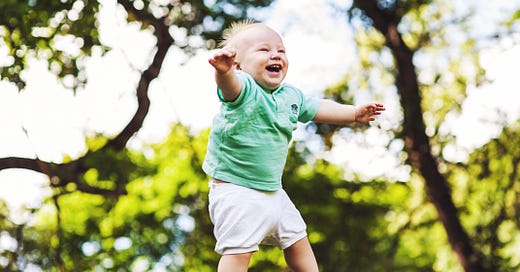The Inexpressible Joy of Childhood Play Is Beyond Any Parenting Book
Why don't parenting books talk more about play?
Parenting books would have you think that parenting is about the “big decisions” - hospital vs. homebirth, sleep training vs. co-sleeping, homeschool vs. public school, etc. While these decisions matter, most of the time you spend with children is not about “big decisions.” It’s about play.
Before I became a parent, I didn’t realize how much time I’d spend with my child just “hanging out.” I’d thought about the “big decisions.” I hadn’t thought about what I’d do with three hours of free time in the morning while Mom got a much-needed nap. It’s probably better that I didn’t, since play is not something one can “plan.” The best moments of play come from spontaneous improvisation, being deeply emotionally connected to my child, and being present in the moment.
Children remind us that life is as much about play as any “big decision.” If you read my work, you know that I love writing about “big decision” issues. Yet, watching my son, I can’t help but think that the reason we incarnate on this planet isn’t to solve the “big decisions” as much as it is to have new experiences like tasting sweet potatoes for the first time or feeling the rain on your hand. Play can be as profound as any “big decision” an adult wrestles with.
It is strange how little parenting books talk about play. There is a lot of discussion in parenting books about how to get your children to do what you want. This “do what you want” command takes many names. If it’s about getting your child to sleep the way you want, it’s called “sleep training.” If it’s thinking the way you want, it’s called “education.” There are even birth books about how to get your child to be born the way you want. Only occasionally does “do what you want” take the overt name of “discipline.” Perhaps this focus on getting children to do what adults want is why the most common activity of children is invisible to parenting books. A predetermined agenda is incompatible with play.
If parenting book authors ever did get a hold of play, I’m sure they’d strangle it, the same way English teachers beat the joy of reading out of children. French philosopher Michel Foucault suggested that commanding an activity to speak by subjecting it to a discourse creates power over it.1 If childhood play were dissected through language, it’d become a corpse. Without names for an experience, we can’t filter it through our language. It is pure Zen beginner’s mind - just like the mind of a child. Without a name, we also can’t share it with others, but isn’t it better that the experience of raising a child remain private and inexpressible, beyond the reach of so-called “experts?” If I could distill a child’s laugh into writing, it’d be the best art ever created.
More on that in this article:






Beautiful post Brendon. Play is how every young being learns. With play, babies and young children emulate the actions of older children and adults they observe, develop dexterity, and so much more.
Kim Hunter's film, "Time To Play" explores this in depth, focussing on the importance of play for young children, as the basis of all learning. A recent interview with Kim is here: https://rumble.com/v2fqakc-awaken-to-a-different-way-of-being-with-your-child.html
Kim's film, "Time To Play" can be seen here: https://timetoplayfilm.com/